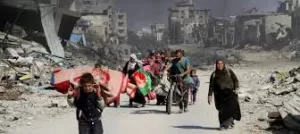Thousands of businesses around the world are jockeying to position themselves better for possible multibillion contracts to reconstruct Ukraine once the war is over. The premise they follow seems to be, “Destroy first, build up later.” International firms’ fight for contracts to rebuild Ukraine resemble disgruntled grandchildren waiting for their grandmother’s death to fight for her inheritance.
More than 300 companies from 22 countries recently participated in a Rebuild Ukraine trade exhibition in Warsaw, one of many similar meetings. In January 2023, at the World Economic Forum in Davos, Switzerland, a crowd packed Ukraine House to discuss investment opportunities once the war is over. In February, the Finnish Confederation of Industries organized a seminar with Ukrainian officials to show how they could contribute to rebuilding Ukraine.
Like all wars, the one in Ukraine has produced winners and losers. The economy of the European countries has been severely affected due in part to higher energy costs. India and China –until now neutral, are projected to have positive growth rates in 2023 and 2024. The biggest winners are oil companies, oil exporting countries like Saudi Arabia, and arms manufacturers such as Lockheed Martin and Northrop Grumman, that continue reaping enormous profits from the misery of millions.
At present, 25 registered lobbyists represent Ukrainian interests pro bono aimed at increasing U.S. military support. This unprecedented increase of over one hundred percent more than before the Russian invasion of Ukraine.
There is a way out of this madness. Fifty-five Nobel prize winners have proposed that countries jointly reduce their military budgets by 2 percent for five years, a relatively modest amount that could exceed $1 trillion. This is more than the total climate and foreign aid combined, and would not upset the balance of power. Those tremendous resources could be used to finance health, education, and other similar projects in developing countries and support social projects in the lending countries themselves.
Such action would redeem General Dwight D. Eisenhower’s words in his Farewell Address, “Every gun that is made, every warship launched, every rocket fired signifies, in the final sense, a theft from those who hunger and are not fed, those who are cold and are not clothed. The world in arms is not spending money alone. It is spending the sweat of its laborers, the genius of its scientists, the hopes of its children.”
What the world needs is a change of paradigm, from one of confrontation and war to one of cooperation and peace. The recent agreement between Saudi Arabia and Iran, brokered by China, is a significant step forward towards peace in that contentious region. It could put an end to hostilities between those nations that could, according to U.N. estimates, have caused the death of more than 377,000 people from violence, starvation, and disease. This deal is an example of what Beijing calls Global Security Initiative, whose focus is promoting dialogue between countries in conflict.
The U.S. has an unparalleled opportunity to promote peace in its own backyard. The U.S. could lift the embargo on Cuba, widely considered the most inefficient foreign policy decision in decades. It has benefitted practically no one, except from some older Cuban exiles in Florida, and has brought enormous misery and harsh living conditions for the Cuban people since it was imposed. This is a situation I was able to assess in several health-related missions to the island.
The U.S. embargo on Cuba has been widely criticized by human rights organizations such as Amnesty International, Human Rights Watch, and the Inter-American Commission on Human Rights. Since 1992, the United Nations General Assembly has passed a yearly resolution demanding an end to the embargo on Cuba. Only the U.S. and Israel, out of all member countries, have voted, consistently, against the resolution.
Lifting the embargo will bring a wave of goodwill in Latin America and in the rest of the world. It can be argued that many lawmakers in Congress –mostly Republican– will certainly oppose that measure. However, it is possible that even the most hardened lawmakers will put national and global interests before their own political interests.
The world is desperate for peace. Many see war as an opportunity for profit, and not as the abdication of the human spirit it truly is. In the meantime, millions of lives continue to be lost and families irreparably destroyed, while the mercenaries of war increase their profits. Numbed by the awesome cruelty of war, we have become inured to its consequences.
(Dr. Cesar Chelala is an international public health consultant, co-winner of an Overseas Press Club of America award and two national journalism awards from Argentina. Courtesy: CounterPunch.)




